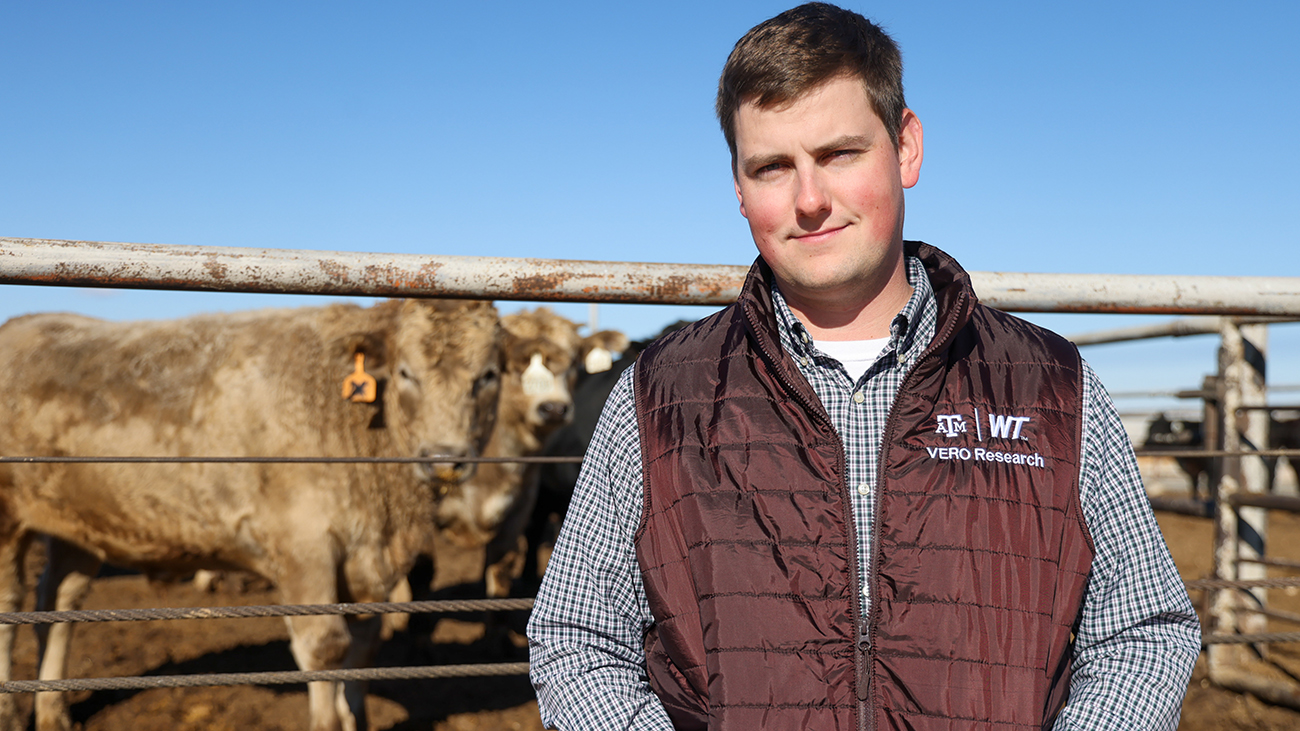- Community
- Research
- Featured
- Agriculture
WT Student Earns First Doctorate in Collaboration with VERO Program
Copy by Chip Chandler, 806-651-2124, cchandler@wtamu.edu
CANYON, Texas — A West Texas A&M University student will graduate with a doctorate Dec. 14 thanks to a unique partnership between the University and the Texas A&M University veterinary school.
Daniel Young, a Pendleton, Indiana, native, officially will be granted his Ph.D. in agriculture during the 10 a.m. Dec. 14 commencement ceremony after successfully defending a dissertation that involved work in both WT’s Paul Engler College of Agriculture and Natural Sciences and Texas A&M’s Veterinary Education, Research and Outreach program.
Through its campus at WT, VERO offers a 2+2 Doctor of Veterinary Medicine program within the Texas A&M College of Veterinary Medicine & Biomedical Sciences, but the Canyon facility also offers plentiful research opportunities.
“The VERO research program is really taking off, and I’m glad to be a small part of it,” Young said.
In working on his dissertation, “Gastrointestinal Health of Feedlot Cattle and Its Relation to Liver Abscesses,” Young split time between the VERO lab and the WT Research Feedlot.
“WT is known for its applied research, but it has been really cool to get to add the basic science side with the VERO lab,” Young said. “It makes me a stronger scientist to experience both sides.”
Young is the first Ph.D. student to come from the partnership of both programs, said Dr. Paul Morley, director of food animal research for VERO and the Sally Rau McIntosh Endowed Chair for Veterinary Strategic Initiatives for the Texas A&M College of Veterinary Medicine & Biomedical Sciences.
“Daniel is at the forefront of a number of students coming along behind him in this program,” Morley said. “It has taken a tremendous amount of work to get the research aspect of VERO up and going.”
Young “excelled in this partnership,” said Dr. John Richeson, the Paul Engler Professor of Beef Cattle Feedlot Management in WT’s Department of Agricultural Sciences.
“Daniel’s an outstanding student who had excellent training in the laboratory but also understands the applied side as well,” Richeson said. “Through his work, we have a better understanding of gut health in beef cattle and how that may relate to liver abscesses.”
Those abscesses are “a multimillion-dollar issue in the feedlot industry,” said Young, who also partnered with the Texas Cattle Feeders Association in his research.
“There’s a really big push in the feedlot industry to look at gut health, and I hope our research will be foundational in that area,” said Young, who has been hired by Telus Agriculture as a production consultant to work with feedlots in the Canyon area.
Pursuing his doctoral degree has a rewarding challenge, Young said.
“Dr. Morley and Dr. Richeson both believe in team science and being able to work together across systems,” Young said. “Being able to be mentored by both of them has been a great experience.”
Though Young is the first to earn a doctoral degree through this type of partnership, Richeson said he won’t be the last.
“We hope to make this typical. We have plans to do more of this in the future,” Richeson said. “We plan to foster and grow the collaboration between VERO and WT.”
Offering responsive doctoral programs is a key component of being a Regional Research University, the primary goal of the University’s long-range plan, WT 125: From the Panhandle to the World.
That plan is fueled by the historic One West comprehensive fundraising campaign, which reached its initial $125 million goal 18 months after publicly launching in September 2021. The campaign’s new goal is to reach $175 million by 2025; currently, it has raised more than $160 million.
About West Texas A&M University
WT, a Regional Research University, is redefining excellence in Canyon, Texas, on a 342-acre residential campus, as well as the Harrington Academic Hall WTAMU Amarillo Center in downtown Amarillo. Established in 1910, the University has been part of The Texas A&M University System since 1990. WT, a Hispanic Serving Institution since 2016, boasts an enrollment of more than 9,000 and offers 58 undergraduate degree programs, one associate degree, and 44 graduate degrees, including an integrated bachelor’s and master’s degree, a specialist degree and two doctoral degrees. The University is also home to the Panhandle-Plains Historical Museum, the largest history museum in the state and the home of one of the Southwest’s finest art collections. The Buffaloes are a member of the NCAA Division II Lone Star Conference and offers 14 men’s and women’s athletics programs.
—WT—

